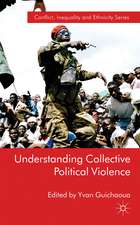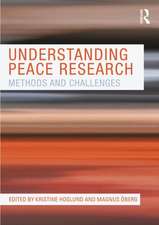Debating War: Why Arguments Opposing American Wars and Interventions Fail
Autor David Lorenzoen Limba Engleză Paperback – 27 aug 2015
This book provides answers to these questions through a survey of oppositional arguments over time, augmented by the views of contemporary critics, including those of Ron Paul, Chalmers Johnson and Noam Chomsky. Author David J. Lorenzo demonstrates how and why a significant number of arguments are dismissed as irrelevant, unpatriotic, overly pessimistic, or radically out of the mainstream. Other lines of reasoning might provide a compelling critique of wars and interventions from a wide variety of perspectives – and still lose. Evaluating oppositional arguments in detail allows the reader to understand problems likely to be faced in the context of policy discussions, to grasp important political differences and the potential for alliances among critics, and ultimately to influence decision-making and America’s place in the international power structure.
| Toate formatele și edițiile | Preț | Express |
|---|---|---|
| Paperback (1) | 364.94 lei 6-8 săpt. | |
| Taylor & Francis – 27 aug 2015 | 364.94 lei 6-8 săpt. | |
| Hardback (1) | 1001.07 lei 6-8 săpt. | |
| Taylor & Francis – 14 sep 2015 | 1001.07 lei 6-8 săpt. |
Preț: 364.94 lei
Nou
Puncte Express: 547
Preț estimativ în valută:
69.83€ • 76.09$ • 58.84£
69.83€ • 76.09$ • 58.84£
Carte tipărită la comandă
Livrare economică 23 aprilie-07 mai
Preluare comenzi: 021 569.72.76
Specificații
ISBN-13: 9781138926899
ISBN-10: 1138926892
Pagini: 242
Ilustrații: 1 black & white illustrations, 1 black & white tables, 1 black & white line drawings
Dimensiuni: 152 x 229 x 15 mm
Greutate: 0.34 kg
Ediția:1
Editura: Taylor & Francis
Colecția Routledge
Locul publicării:Oxford, United Kingdom
ISBN-10: 1138926892
Pagini: 242
Ilustrații: 1 black & white illustrations, 1 black & white tables, 1 black & white line drawings
Dimensiuni: 152 x 229 x 15 mm
Greutate: 0.34 kg
Ediția:1
Editura: Taylor & Francis
Colecția Routledge
Locul publicării:Oxford, United Kingdom
Cuprins
1. Opposition to Wars and Interventions 2. From the Early Republic to the Spanish American War 3. The Great War and World War II 4.Arguments in the Cold War and Post-Cold War Eras 5. Ron Paul: The Importance of Natural Order 6. Noam Chomsky: Hegemony and Manufactured Consent 7. Chalmers Johnson: The Military Empire 8. Comparisons, Analysis and Conclusions
Recenzii
'There is a tendency to dismiss American arguments against war as isolationist, yet as this impressive book reveals, that view is far too simplistic. By presenting a more complex and nuanced assessment of past disputes, Debating War furthers and deepens our understanding of the diverse array of American impulses against war, as well as considering why those arguments have had limited historical success.' - Dr. Andrew Johnstone, University of Leicester, United Kingdom
'A sweeping analysis of modern and historical antiwar opposition in the United States. David Lorenzo addresses the broad variety of such criticism and raises important questions about the relative successes and failures of such critiques of U.S. foreign policy.' - Fabian Hilfrich, University of Edinborough, UK
'A sweeping analysis of modern and historical antiwar opposition in the United States. David Lorenzo addresses the broad variety of such criticism and raises important questions about the relative successes and failures of such critiques of U.S. foreign policy.' - Fabian Hilfrich, University of Edinborough, UK
Notă biografică
David J. Lorenzo is Associate Professor in the College of International Affairs at National Chengchi University
Descriere
What arguments have domestic critics of American wars and interventions put forward in the past, and what arguments do they currently employ? Thomas Jefferson, Henry Thoreau, John Calhoun, the Anti-Imperialist League, Herbert Hoover, Charles Lindbergh, Martin Luther King Jr., and Ron Paul (among many others) have criticized proposals to intervene in other countries, enter wars, acquire foreign territory and engage in a forward defense posture. Despite often cogent objections, they have also generally lost the argument. Why do they lose? This book provides answers to these questions through a survey of oppositional arguments over time, augmented by extended discussions of the views of several contemporary critics that serve as examples of modern arguments, including Ron Paul, Chalmers Johnson and Noam Chomsky.
















